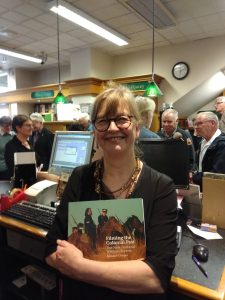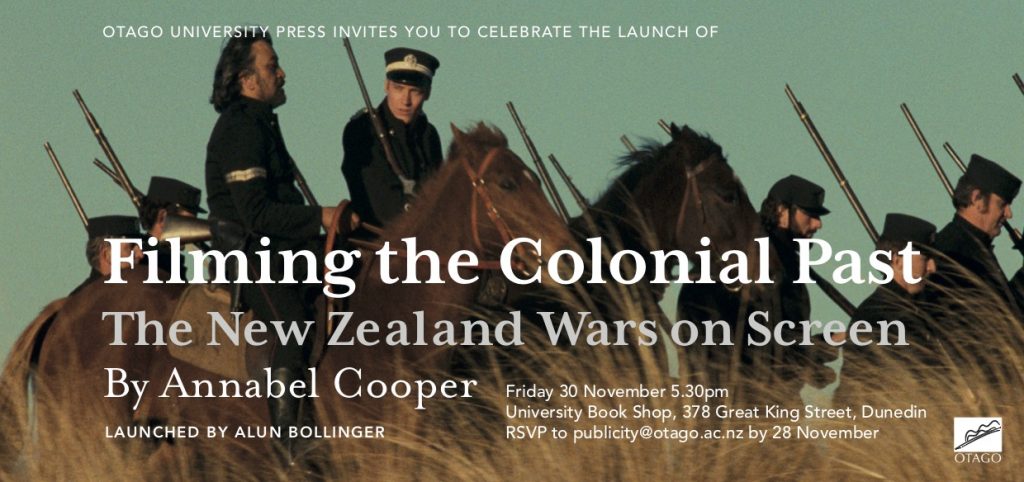CROCC member makes Ockham long list
Congratulations to CROCC member Annabel Cooper. Her book, Filming the Colonial Past: The New Zealand Wars on Screen (Otago University Press), has been placed on the long list for the 2019 Ockham Book Awards, New Zealand’s foremost book awards. Click here for more information on this outstanding book.
Book Launch: Filming the Colonial Past
Congratulations to Annabel Cooper on the release of her book, Filming the Colonial Past: The New Zealand Wars on Screen, published by Otago University Press.
If you want to purchase a copy, please join us at UBS on Friday 30 November when Filming the Colonial Past will be officially launched by Alun Bollinger.
Screen Wars: Remaking the New Zealand Wars in Celluloid and Pixels
Centre member, Associate Professor Annabel Cooper, is presenting a video conference seminar for the The Identities Network: Constructing and Contesting Dominant Identities in Aotearoa on Tuesday 1 November, beginning at 3pm.
Annabel will be discussing her current project Screen Wars: Remaking the New Zealand Wars in Celluloid and Pixels, a book on screen productions relating to the New Zealand Wars, from 1925 until the present day. The book covers fictional and non-fictional treatments, and film, television and digital media. One distinctive quality that they all share makes screen stories a particularly significant mode of making history about the colonial past: their creation involves both Māori and Pākehā actors, historical advisors, and to greater or lesser extent, crew. For most of these productions the film-makers also elected to film at or near historical locations. So, film productions operate as sites of encounter as well as sites of knowledge production. To what extent are the traces of these encounters, and these whenua, apparent on the screen? Each of these productions created a colonial past for a specific present. This body of successive reiterations provides an index to cultural memory of the colonial past. So, the question of which historical events seemed most compelling to successive generations, how the same figures were rendered at different historical moments, and the shifting emotional registers as the wars came to be thought of in different ways, is also central to this study.
In this session Annabel will take two examples from her book to discuss the way each is shaped by the tangata and the whenua of their production, by their filming on location, and by the traces of their presents as they render their pasts.
Venue: Your University videoconference room or your desktop
Time: Tuesday 1 November, 3 – 4pm
Register: Email Melanie m.milicich@auckland.ac.nz stating the seminar name and venue Chair: Avril Bell
Cowan Symposium Call-for-Papers
Call for Papers
New Perspectives on James Cowan
A One-Day Symposium
Centre for Research on Colonial Culture and the Alexander Turnbull Library
National Library, Wellington, 21 February 2014
James Cowan is best known for his official history of the New Zealand Wars, but his significance for the production and circulation of knowledge about Māori in the late colonial era covered a broad range of subjects. Alan Mulgan wrote after Cowan’s death in 1943 that more than anyone else, he had ‘shown us how to think as New Zealanders’. Mulgan signaled here not only Cowan’s prolific writing, but also his cross-cultural engagement from the 1890s to the 1940s. He was himself a figure of the type he so admired: the cultural go-between. Although his work often purveys the racial ideologies of his time, Cowan’s early use of oral historical methods, and familiarity with a wide range of Māori informants, effected the transition to print of much that would not otherwise have been circulated in Pākehā contexts, or recorded in print.
Cowan’s reputation has fluctuated in response to shifts in cultural politics, writing and historiography. His work began to attract contemporary scholarly attention with an article by Chris Hilliard in NZJH in 1997. Stories of the New Zealand Bush has been republished recently with a critical introduction by Alex Calder. The Adventures of Kimble Bent was read on National Radio in 2011, and re-written as a graphic novel, and film-makers have drawn on his work over decades. Some dimensions of Cowan’s work invite closer study: his significance for iwi history, his photographic collection, and the personal life of this particularly colonial figure, for example, would repay investigation.
For this one-day event, we invite papers which evaluate Cowan’s contribution to colonial encounter and colonial memory from a wide range of perspectives.
Please send abstracts (up to 250 words) and a bio (up to 100 words) in a Word attachment, by 30 September 2013.
Abstracts and enquiries should be sent to: cowan.symposium@otago.ac.nz
Further information about the symposium will be forthcoming.
Associate Professor Chris Hilliard, University of Sydney, will give a concluding commentary.
Convenors
Annabel Cooper (Centre for Research on Colonial Culture, U of Otago)
Ariana Tikao (Research Librarian, Māori, Alexander Turnbull Library),



